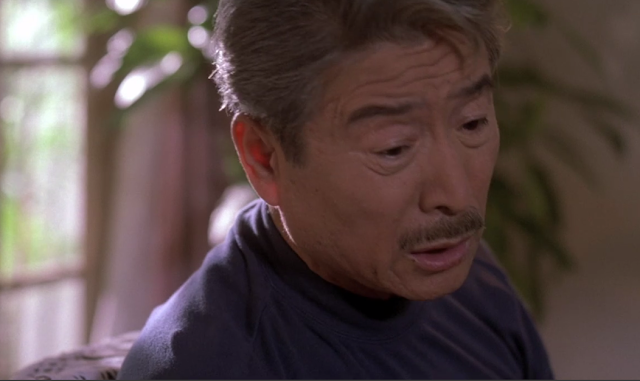Life should not be like cooking, you need to wait until all ingredients are prepared.
Directed by: Ang Lee
Starring: Sihung Lung, Yu-Wen Wang, Chien-lien Wu, Kuei-Mei Yang
Genre: Comedy, Drama
Runtime: 124 minutes
WI's Rating: 8.0
 |
| Chu: Eat drink, man woman,food and sex. Human basic desire. Can't avoid them! All my life, every day, all I do. It pisses me off. Is that all there is? Is this a good life? |
A veritable smorgasbord of all the things that make life worthwhile, including good friendship, love, food and sex, can be found in Ang Lee's `Eat, Drink, Man, Woman,' the story of a widower who has raised three daughters on his own, and now that they are grown is ready to move on with his life. Chu (Sihung Lung), a celebrated chef who runs the kitchen of a huge restaurant, finds himself at an impasse however; his daughters, Jia-Jen (Kuei-Mei Yang), the eldest, a teacher, Jia-Chen (Chien-lien Wu), his second, an airline executive, and Jia-Ning (Yu-Wen Wang), the youngest, who works at a fast food restaurant, all still live with their father, and though they are adults (all in their twenties), he feels responsible for them, as they are still under his roof. They, on the other hand, feel responsible for him; he'll soon be retired, and they fear age is catching up with him. And it makes them each, in turn, think twice about career opportunities and any romantic entanglements that may appear on the horizon. it's a situation they all realize is not conducive to a happy, fulfilling and fully functional family life; the love is there, but it's seasoned with frustration, and no one seems to know what to do about it.
As in all Ang Lee films the cinematography is spectacular, and the opening sequence is a wonderful demonstration of Chinese culinary excellence, and it is almost impossible not to stop the film right there, go and get some chinese takeaway to eat, and come back to enjoy the film without the cravings that this film inevitably produces. The Characters are complex and likeable, and the relationships between them is what this film is all about. The family is slightly dysfunctional and communication is often strained but as the movie develops these dialogs become more heartfelt, and the love between the characters becomes more and more apparent.
Lee has crafted and delivered a complex, involving film, laced with poignancy and humor that deals with the kinds of problems most people face during the course of their lives. And, of course, there's the love, the many faces of which are all explored here. Food is the metaphor; Chu sets his table with a variety of tantalizing and exotic offerings, even as the table of life is set with like fare, and once set, it is up to the individual to sample what they will. Fittingly, it is at the dinner table that many of the meaningful events in the lives of the family members are revealed. Lee uses the intricate emotional weave of the story to optimum effect with his ability to illuminate the sensibilities of his characters, and that he does it so well demonstrates the depth of his own insight into human nature. And that he can so proficiently transfer the emotions of the written page to the screen demonstrates his mastery of the art of film directing. Finally the story is wrapped up in a stunningly sincere and beautiful scene between father and daughter, which invariably leaves me sitting in total silence until the end of the credits.
 |
| Chu: Men die for money, birds die for food. It's not worth dying for food for a man. |
Lee has also turned what might have been merely an extended Taiwanese soap opera into a wise and warm exploration of family relationships, love and friendship, against the backdrop of a traditional society adapting to the modern world. Fascinating in themselves, the food preparation sequences serve as a metaphor for the skill required to transform bare existence into a rich life. As with real life, `Eat, Drink, Man, Woman' is far from predictable, and is filled with twists and turns, including a surprise at the end. In the final analysis, this film is a delightful, entertaining reflection upon the human condition that will awaken your taste buds and prepare you for the feast of life.














 The Prestige (2006)
The Prestige (2006)












